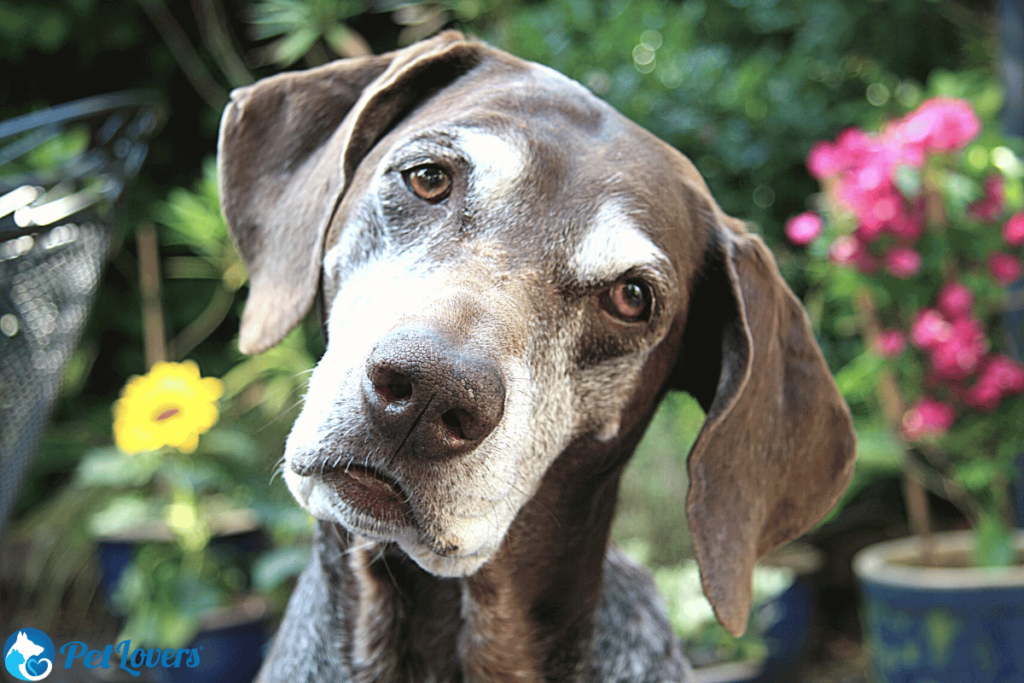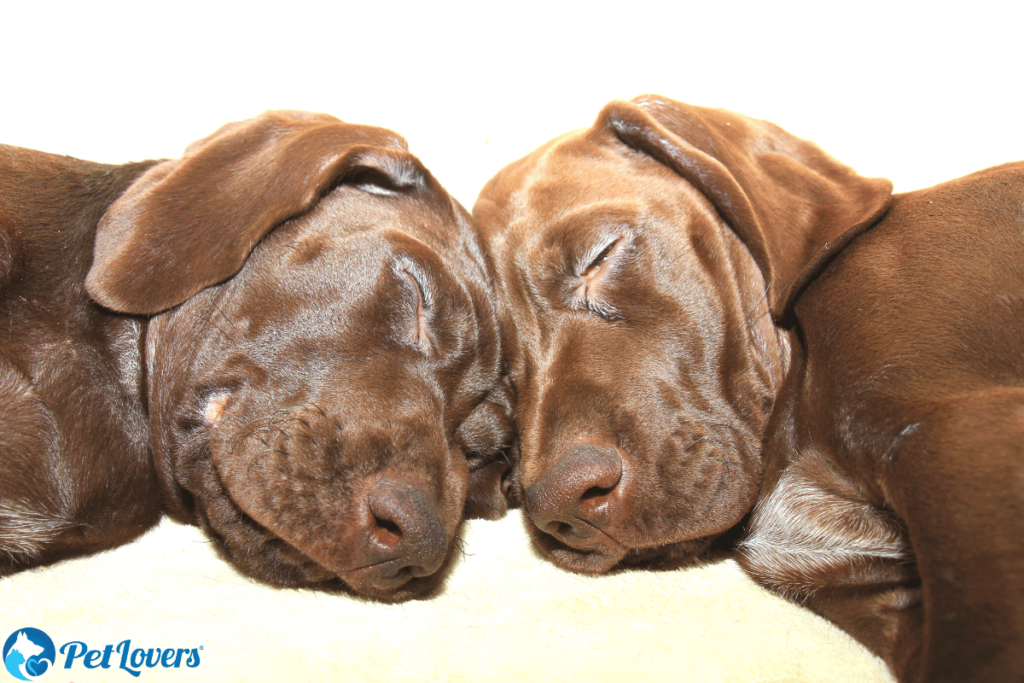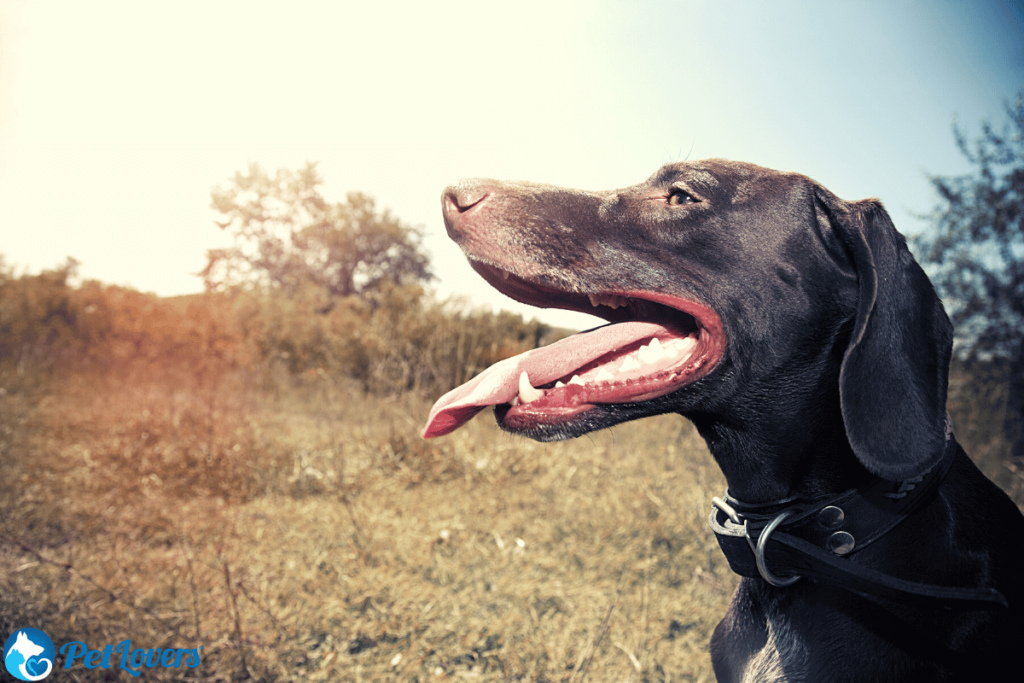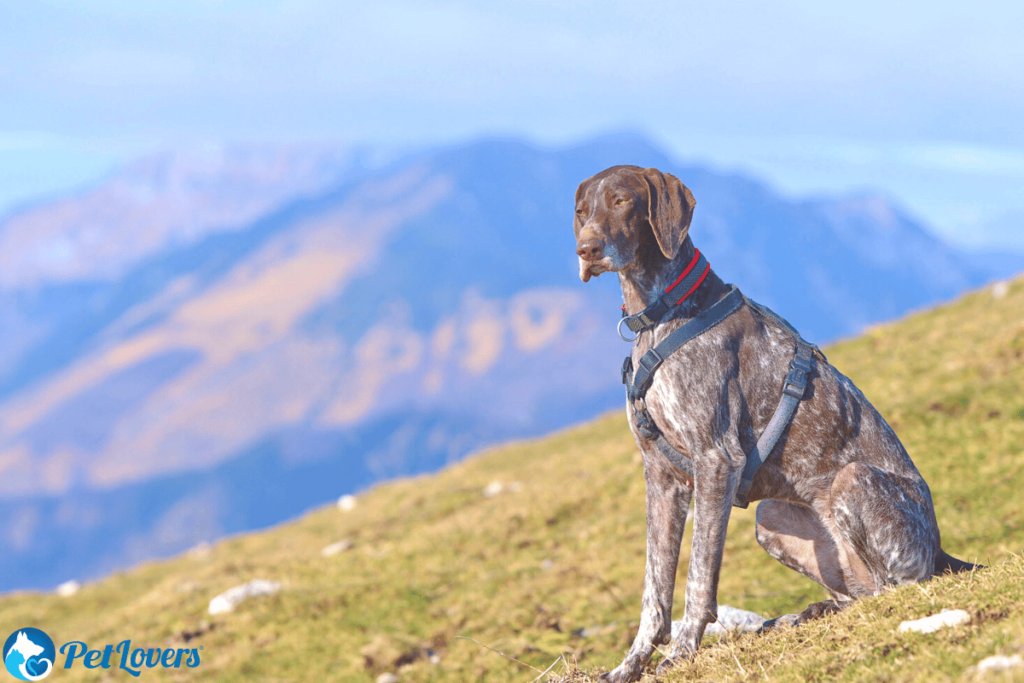Types Of Dog Brushes
Grooming your dog regularly helps minimize shedding, control where that loose hair falls, and improve the health of your dog’s

Understanding the shedding habits of different dog breeds can have a big influence on your final decision. Each dog sheds differently but what about the popular German Pointer? Do German Shorthaired Pointers Shed? They certainly do, but you can take steps to reduce and manage their shedding habits with ease, let’s jump into it.
Table of Contents
German Shorthaired Pointers are moderate shedders, with only a mild amount of loose hair falling from the coat. The GSP has a thin, short-haired, solid-liver coat that is smooth, slick, and durable.
Much like any other dog breed, they do shed consistently throughout the year. German Shorthaired Pointers are the very successful result of German breeders’ search for the perfect bird-hunting dog. Hunters wanted an athletic dog, with great endurance and, a keen nose.
Breeders of the time spent decades breeding a variety of hunting dogs until they arrived at the German Shorthaired Pointer, in the late 1700s. This was a dog that could do it all, and it is still considered the best dog breed by today’s bird hunters.
Double-coat dogs shed consistently throughout the year, and they also blow their undercoat before summer and winter. These dogs do so to prepare a thinner or thicker coat, ahead of changing temperatures.
The German Shorthaired Pointer is a single-coat breed, which means that it doesn’t shed seasonally. This coat keeps the dog warm in the cold and cool in warmer climates.

As with almost all other breeds, a German Shorthaired Pointer will begin life with a soft and supple puppy coat, which it will have for its first year of life.
This is the only time in its life that the GSP will fully shed its coat. An adult German Shorthaired Pointer will continue to shed very small hairs for the rest of its life. The reason for this is to keep the coat healthy.
Shedding is the removal of damaged or dead hairs, to make way for new hairs. If a GSP remains healthy throughout its adult life, it will shed consistently until its later years, when owners may see an increase.
Much like humans, the GSPs coat will thin out with age. There are, however, additional factors that could result in heavy shedding, most often related to the German Shorthaired Pointer’s health.
Medical conditions like diabetes, liver disease, or cancer can result in excessive shedding. So too can mental health issues like increased stress or depression.
The biggest issue that owners have with German Shorthaired Pointer shedding is not the volume, but the type of hair. The GSP coat has so many tiny hairs, they can be difficult to clean up around the home.
If a GSP begins to shed more, for any reason, cleaning becomes even tougher. There are some tips we’d recommend that you follow, to reduce shedding and ensure that the GSP maintains its healthy coat. Any action you take to improve a dog’s coat will also have a positive impact on its general well-being, it’s a win-win situation.
Some owners are guilty of not paying enough attention to a dog’s health. This is not to say that they don’t care, but rather that they aren’t knowledgeable enough about a dog’s needs.
The health of a German Shorthaired Pointer is directly linked to its shedding behaviors. Any changes to its physical or mental health can very quickly result in excessive shedding.
A healthy coat should be soft and smooth. If a GSP is in bad health, its coat will look greasy and it may even have patches missing.
German Shorthaired Pointers love to eat and will burn calories quickly when they are out and about. A healthy diet should contain the following:
When feeding dogs like a German Shorthaired Pointer, quality ingredients are very important. Owners should always investigate dog food thoroughly before buying.
German Shorthaired Pointers can have some kibble, although many experts are recommending that dog owners avoid dry food. The issue with a lot of kibble is that it is carb-heavy.
Dogs don’t have a dietary need for carbohydrates at all. Naturally, if you feed dogs vegetables and fruit, they have to digest the carbs somehow. Dogs have evolved to break down these carbs with enzymes and turn them into glycerin stores.
Although hunting dogs burn a lot of fuel, they don’t require additional carbohydrates from dry food. German Shorthaired Pointers are intelligent, and they would benefit from a different feeding approach. Lick mats are a great example.
Owners place food items in different areas of the mats, making it challenging for the dog. Another option is to freeze food a little, making it harder to eat. When dogs are stimulated, they are less anxious, and that is all good news for the dog’s coat.
It is also important to pay attention to your dog’s hydration. If your German Shorthaired Pointer is drinking more or less than usual, it may be a sign of health problems.
If you are in any doubt as to what the best diet looks like, don’t be afraid to speak with your vet to get some advice.
For German Shorthaired Pointers shedding, levels can change very quickly based on their activity levels. Just think, this dog used to spend hours and hours roaming over different landscapes. The GSP’s desire to move and run around is still the same.
German Shorthaired Pointers will need at least 1-2 hours of exercise per day, or more if possible. This is an important consideration for would-be owners to make because daily exercise is a necessity for the GSP.
This is a generally healthy breed, and that is down to the fact that it has historically been so athletic. Failing to give a German Shorthaired Pointer enough exercise will have dramatic consequences on its health.
A dog like the German Shorthaired can get stressed and anxious when it isn’t running around. These dogs produce several steroids in the body to cope with such stress. When they do get the chance to play with other dogs or get some miles in their legs, they burn off that anxiety.
If your German Shorthaired Pointer becomes anxious, it will shed much more than normal. Remember that 1 hour of exercise is the bare minimum, 2 hours or more is optimal to keep a GSP in top condition.

The German Shorthaired Pointer’s coat is made up of hair with natural oils in it, which does a great job of repelling dirt. For this reason, German pointers don’t need to be washed regularly.
Many experts, including those at the American Kennel Club, recommend bathing your GSP once every 4 months. We tend to agree with that, although we have to factor in the general behavior of a German Shorthaired Pointer, especially when they are out in nature.
German Shorthaired Pointers love roaming, discovering, and getting pretty mucky as they do it. If you have a GSP and they indulge in some antics in the mud, you may have to wash them sooner than you were planning.
Washing is still important for German Shorthaired Pointers, and it can help to reduce shedding. Unlike longer-haired dog breeds, GSPs aren’t prone to matting or anything that could impact shedding.
With this said, it is a great opportunity to clean any dirt or even parasites, that have affected the dog’s skin or that solid-liver coat.
The little hairs that fall from a German Shorthaired Pointer’s coat are annoying to clean up more than anything else. The dog hair is short, bristly, and akin to hairs you may see after a beard trim.
The great news, however, is that there aren’t many of them to clean up. As long as you have a system in place, your German Shorthaired Pointer shedding around the home won’t be much of an issue at all.
These are low-maintenance dogs when it comes to shedding, but owners will still need to stay on top of shedding habits. Here are some tips we’d recommend, that will help owners to manage to shed around the home
Given the way that the German Shorthaired Pointer was bred, it is a very disciplined dog. The responsibility is of course on GSP owners, to give the correct training.
This can be used to your advantage if you don’t want the dog to have free rein in the home. Teaching German pointers not to jump up on furniture or not to go upstairs, for example, can minimize how much of the dog’s coat ends up on your floor, furniture, and clothing.
There are 3 gadgets that you will need, to effectively manage the loose hair from a German Shorthaired Pointer.
When buying a vacuum cleaner, aim to find one that is designed to clean up pet hair. These are more powerful and better at picking up the small hairs that most dogs leave behind.
A pet hair removal tool is handy to have around in living areas where your dog is allowed. This can be used to collect dog hair from soft surfaces and smooth fabrics.
The issue with many short hair dogs like the German Shorthaired Pointer is that the hairs can penetrate the fabric. Using a pet hair removal tool each day is the best way to prevent these hairs from getting lodged in cushions and sofas.
Pet hair lint rollers can be used on soft furnishings, and they are brilliant at getting all of the little hairs off your clothes. If you get a German Shorthaired Pointer, you’ll soon realize how problematic those wiry hairs can be.
Give clothing the once over with a lint roller and you can leave the house without worrying that your clothes are covered.
If you get a German Shorthaired Pointer shedding won’t become an issue, as long as you have a consistent approach to cleaning up loose hairs. Just 20 minutes each day will ensure that your home is hair free.

Regular grooming will ensure that your German Shorthaired Pointer looks good, feels good, and sheds less. Owners can do this on their own, or use professional grooming services once in a while for the full treatment.
The most important task is to give this dog a good brush every couple of days. Using a firm bristle brush, stroke down the dog’s coat from its head to its paws.
You can use a slicker brush as well, as regular brushing will ensure a smooth coat, free from any dead or damaged hairs. When brushing, don’t dig the brush in too far, as it causes an issue for this dog’s sensitive skin.
GSPs are more likely to have skin issues than other dog breeds. During the shedding period between puppy and adult, you will have to brush more frequently to cope with the excess shedding.
Paws – Apply paw balm once a week, to prevent them from drying out
Nails – Clip once a month
Ears – GSP ears should be cleaned once a month
Eyes – Use weekly eye drops to keep them bright and clear
Be careful when selecting products for your dog’s coat. Some products that are fine for other breeds are not always right for the German Pointer’s skin health.
German Shorthaired Pointers are intelligent, multitasking dogs who shed a very moderate amount of their coat each year. The breed’s discipline and caring nature, make it a good family dog too. German Shorthaired Pointer owners will need to put time and effort into keeping the dog healthy. As long as you have the time to spend on ensuring that your furry friend gets enough exercise, this could be a great option for your new dog.
Let’s take a look at some German Shorthaired Pointer FAQs.
German Shorthaired Pointer shedding habits mean that it cannot be classified as hypoallergenic. They may not be heavy shedders, but they shed enough to cause issues for those with allergies.
This dog breed is cuddle crazy, yet another reason why they are great family dogs. This is also why they’ll enjoy regular brushing sessions, with plenty of human contact.
 PetLovers
PetLovers
Grooming your dog regularly helps minimize shedding, control where that loose hair falls, and improve the health of your dog’s
Have you begun to notice a little more cat fur around the home than you are used to? Most cat
A slicker brush is one of the most essential tools in your dog grooming arsenal. This product can do it
TO GET 15% OFF ON ALL YOUR PURCHASES